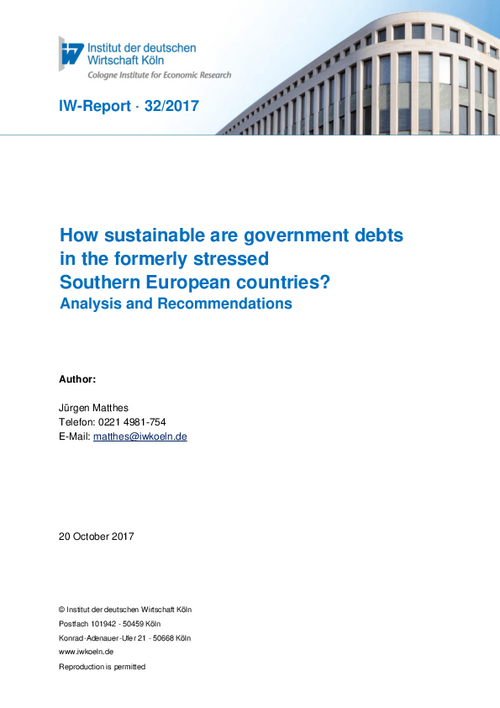Will the sovereign debt of Italy, Spain and Portugal remain viable even if interest rates rise again and a moderate recession occurs? This debt sustainability analysis which comprises three relatively realistic scenarios and extends to 2022 comes to a differentiated conclusion.

How sustainable are government debts in the formerly stressed Southern European countries?
IW-Report

Will the sovereign debt of Italy, Spain and Portugal remain viable even if interest rates rise again and a moderate recession occurs? This debt sustainability analysis which comprises three relatively realistic scenarios and extends to 2022 comes to a differentiated conclusion.
On the one hand, public debt ratios remain high not only in the moderately pessimistic scenario that includes a brief recession in 2019. This is also true in the baseline scenario (with rather conservative assumptions), mainly in Italy and to a lesser extent in Portugal and Spain. Only in the moderately optimistic scenario is the reduction in the public debt ratio somewhat faster in Italy, and all the more so in Portugal and Spain. However, even in this scenario it will take considerably longer than 2022 until the public debt ratios in Italy and Portugal will fall below 100 per cent of GDP. On the other hand, the public debt does not spiral out of control under the chosen assumptions, even in the rather pessimistic scenario. An important prerequisite is that fiscal policy, particularly in Italy (and somewhat less in Portugal and Spain), reacts with moderate consolidation. The primary surplus needed for stabilization is considerably below 3 per cent of GDP and thus within a reachable range. Therefore, there is no reason for the financial market to regard the debt situation unsustainable under normal conditions. However, this might be different if a deeper crisis or self-fulfilling prophecies on the financial market occured or if populist parties dismissed the course of moderate fiscal consolidation.
In order to reduce the vulnerability caused by the high public debt levels and to avoid deeper crises, the main focus of economic policy should be on strengthening the growth potential and on avoiding economic and financial overheating. Growth enhancing measures are, above all, smart structural reforms and a reduction of private debt legacy burdens of the crisis. In addition, a more ambitious strategy for inclusive fiscal consolidation is needed. This is also required to enable countries to combat future recessions primarily with automatic stabilizers at the national level. If the financial market should not allow this, a new type of ESM-light programme should be introduced. It would allow for a limited increase in the fiscal deficit, but countries would have to pre-qualify for it by adhering to the European fiscal rules. In order to increase the market discipline and thus the consolidation incentives, accountability bonds are recommended. In addition, in order to revive the no-bailout clause, exposure limits are required for banks’ portfolios of domestic sovereign bonds. Moreover, changes to the collective action clauses in sovereign bonds are necessary to allow a single vote so that holdout investors can be outvoted. To avoid crisis escalations, ESM assistance must also be credible for large countries. Therefore, the maturities of government bonds should be extended with an ESM programme, while interest payments and nominal value of the bonds would remain untouched.

Jürgen Matthes: How sustainable are government debts in the formerly stressed Southern European countries? – Analysis and Recommendations
IW-Report

More on the topic
China’s Trade Surplus – Implications for the World and for Europe
China’s merchandise trade surplus has reached an all-time high and is likely to rise further. A key driver appears to be a policy push to further bolster Chinese domestic manufacturing production, implying the danger of significant overcapacities.
IW
Is the EU Fit for 55 and Beyond?
Ursula von der Leyen was elected President of the European Commission by the European Parliament in July 2019. She assumed office in November 2019 and unveiled the European Green Deal in December 2019 (European Commission, 2023a) as a focal point of European ...
IW